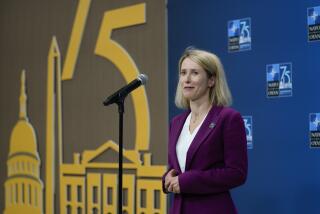Turkey’s Foreign Minister Quits; Political Crisis Brews
- Share via
ISTANBUL, Turkey — Mumtaz Soysal, Turkey’s controversial foreign minister, resigned with a characteristic flourish Monday, plunging the coalition government of this Muslim nation of 60 million into fresh political crisis.
Soysal, of the Social Democratic People’s Party, cited “deep differences in our understanding of government” in his terse resignation note to Prime Minister Tansu Ciller, leader of the conservative True Path Party. She lost no time in accepting it.
“Mr. Soysal’s departure was influenced by some basic approaches to foreign policy,” Ciller said in a statement. Soysal is suspicious of the United States, pro-Iraq and wary of foreign investment--positions diametrically opposed to those of his coalition partners.
The impact of the resignation is likely to be felt first in the domestic arena. The ruling coalition and Turkish politics in general have been in turmoil since a dispute over electoral lists last week forced the postponement of parliamentary by-elections that were scheduled for next Sunday.
Ciller has not announced a new election date, saying Turkey must concentrate on more important issues. She wants to work to stabilize the nation’s shaky finances by raising a hoped-for $5 billion from privatization of state businesses next year. Also needed are new laws on free competition, patents and copyrights--vital if Turkey is to successfully conclude talks with Europe on a special trade status by the end of next year.
But all these projects are overshadowed by the apparently insoluble weakness of the coalition and by Ciller’s lack of any real alternative within the current arithmetic of the 450-seat Parliament. “Only a general election can solve the problem,” wrote Hasan Cemal, one of Turkey’s most respected commentators.
Ciller had clashed with Soysal over several issues since she approved his appointment as foreign minister four months ago. She had accepted him in the hope he would be less obstructive of her privatization plans inside the government.
But the sharp, argumentative 65-year-old law professor continued to dilute Ciller’s plans to privatize many state banks and industries, which finally became law Thursday. Soysal also imposed visa requirements for U.S. and other Western nationals in pursuit of what he called a foreign policy “with honor.”
Soysal is also known to oppose the U.S.-led Operation Provide Comfort, whose 50 aircraft have flown from bases in Turkey to protect the Kurds of northern Iraq from Iraqi President Saddam Hussein. If the government survives, his departure will probably make renewal of the force’s mandate easier in December.
But almost all commentators believe Soysal’s resignation marks the end of the road for the coalition government that has ruled Turkey since 1991. Ciller has so far failed to find a new partner in Turkey’s fractured Parliament to carry her through to the next general election, due in 1996.
More to Read
Sign up for Essential California
The most important California stories and recommendations in your inbox every morning.
You may occasionally receive promotional content from the Los Angeles Times.












